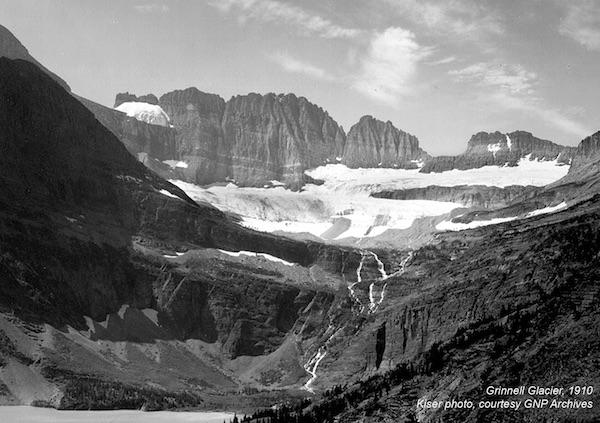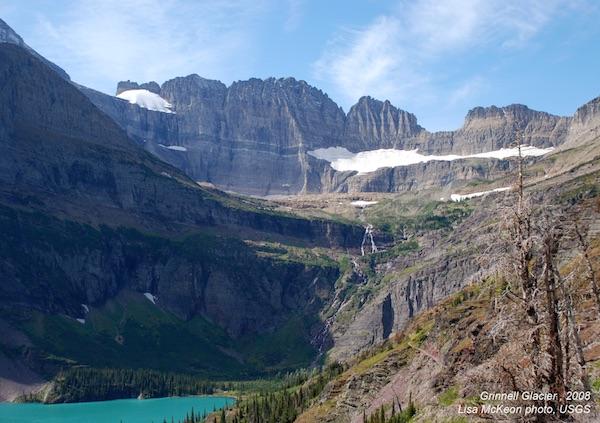
Grinnell Glacier in 1910/Fred Kiser photo, courtesy of Glacier National Park Archives
With the possibility that Glacier National Park will be glacierless by as soon as 2020, are you moving up your plans to visit the park?
That seems a reasonable question, both in light of recent weather patterns, warming temperatures, and the ability to glimpse a glacier upclose without traveling to Alaska. Not too many years ago scientists were predicting that Glacier's glaciers would be meltwater by 2030. But now they're moving the date up, to around 2020, due to the heightened pace of warming.
According to a story that ran on National Geographic's website in September 2013, "Since 1900, the mean annual temperature in Glacier National Park has increased by 2.4 degrees Fahrenheit (1.3 degrees Celsius)'1.8 times the global mean increase. Snowmelt is occurring up to a month earlier, and more precipitation is falling as rain rather than snow." And while one year does not make a trend make, snowfall this winter is running behind in Glacier, as is the snow water equivalent in that snowpack.
So, with the possibility that the park's glaciers will vanish in another five years, are you thinking of moving up your trip to Glacier?

Grinnell Glacier in 2008./Lisa McKeon photo, USGS

 Support Essential Coverage of Essential Places
Support Essential Coverage of Essential Places







Comments
Even without glaciers, there is so much to do in this park. And it's not like the lack of glaciers will kill off the scenery or the plethora of wildlife species. In my book, it remains the most stunning National Park i've ever had the pleasure of visiting.
Yes. To North Cascades, as well.
Great before and after pictures, Kurt. They remind me of what I looked like in 1947. Ugh! I'm melting, too! Or is it fair to call sagging melting? My point is: The Rocky Mountains are not about to sag, and one day (although we won't live to see it) will form great glaciers again. Probably Brian Williams's great grandfather, 10,000 times removed, offered the same sage advice. "Last chance to see the Bering Land Bridge. . . Damn! Now we will have to start building our own."
We are getting 4 to 8 inches of snow here in Washington and would be happy to export it all to Glacier if only there were a way to do so. I much rather see snow on the mountain than in my front yard and road.
Well said, Harry.
(We're having an interminably snowy winter in New England.)
In the summers of 1961 and 1962, I was a young geology student who had the privilege of working on glacial surveys on Middle Teton Glacier in GRTE, and Blackfoot Glacier in GLAC.
Today, both of those glaciers have shrunk to just remnants of what they were then. Blackfoot is, for all intents and purposes, gone. It broke into two separate glaciers some time ago and both are now not much more than permanent snowfields.
We could argue from now until forever about why this is happening. That would accomplish nothing -- as we've witnessed in these very pages. But whatever is happening and why it is happening is not something we should -- or can -- simply ignore.
There can be no doubt that with more than 7 billion people inhabiting our spaceship (and rapidly approaching 8 billion) our delicate planet is supporting more large living things than ever in its history.
Do we not have a serious responsibility to ourselves and our posterity to at least make a sincere effort to learn what we must do to protect our only home?
I'm reading an excellent book. The Human Age, The World Shaped by Us by Diane Ackerman. Written in wonderfully lyrical -- almost poetic -- language, she drops little bombs of common sense on just about every page. She uses a new word: Anthropocene to describe the Human Age on Earth. We've always used other names for earth's geologic ages, such as Permian or Holocene, but she believes it's time for a new one. Anthropocene -- the Human Age because of the incredible impact we humans are having upon the planet.
She points out that human biomass is now 10x greater than any other large animal species ever in the past. Humans and our domestic animals now make up 90% of ALL animal biomass on earth. A thousand years ago, we comprised only 2%.
Her message is simple. Earth is about 4.5 billion years old, but humans have completely transformed the planet and have become the dominant species in less than 200 years.
One of the simple truths that hit me between the eyes is this one: "We can't have cities, cars, jets without creating wastelands. For every act of creation, there is an act of destruction." When we build a skyscraper, we simultaneously create a hole where the material for that skyscraper was mined.
She writes about looking down on earth from space and seeing a planet lit by sparkling artificial lights: ". . . shopping centers and seaports sizzle with light, as if they are frying electrons."
Or: "Rocks of the future will tell the story of a time when Earth was swarmed over by intelligent apes who whipped the weather into something they hadn't quite intended."
An excellent book that we all should read.
Or shall we be satisfied to sit and do nothing more than argue with one another while we continue to foul the only nest we have?
Why not?
Read the book and find out. Or will you be satisfied to sit and do nothing more than argue with others while we continue to foul the only nest we have?